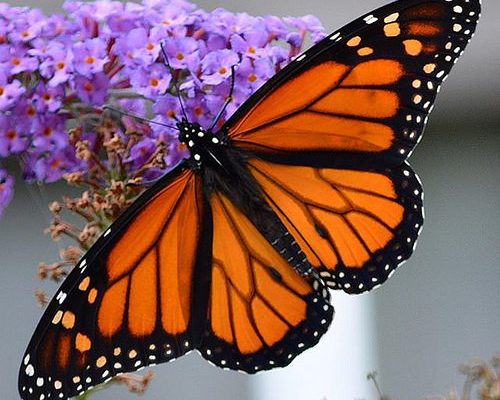
Who are our pollinators and why are they important?
Many different animals pollinate plants, such as birds, bats, butterflies, moths, flies, beetles and BEES! Bees are responsible for pollinating most of the worlds flowering plants and animal-pollinated foods.
Scientists estimate as many as 90% of flowering plants rely on insects and other animals. These pollinators affect production in 35% of the world’s food crops…that means one in every three bites of food exists because of animal pollinators! Foods like potatoes, chocolate, apples, bananas, coffee, pumpkins, almonds, blueberries, and so many more need pollinators to survive!
What is causing pollinator decline?
Several factors contribute to pollinator decline, but loss in feeding and nesting habitat is widely thought to be the leading cause in population losses. Creating garden spaces and nesting areas for pollinators is a great way to improve their chances of productivity, but unfortunately it’s not that simple. Many plants are treated with chemical insecticides called neonicotinoids, proven toxic to bees. If seeds or starts are treated with “neonics,” the garden can actually do more harm than good to our local pollinators.
The importance of using native plants
Native plants, insects, and other animals have evolved together over millennia. This is not a peaceful co-existence—more of an arms race. Plants have evolved deterrents to keep herbivores at bay, the caterpillars and other herbivores develop resistance . . . . Flowering plants also woo particular pollinators to successfully reproduce. These relationships have led to the flourishing of the natural world around us. When we introduce plants that evolved elsewhere, we disrupt these natural systems. Non-native plants feed far fewer insects, which in turn feed fewer birds. It is little wonder that insect populations are collapsing and that most insectivorous bird populations are in decline.
Where to find native neonic-free plants for your yard and garden
Many nurseries and garden centers in the area are unsure of the chemical content of their flowers (and the seeds they germinated from). What we can do as consumers is ASK! Ask if the flower starts and seeds they sell are free of neonicotinoids. If they’re not, let them know that is what you want. Let them know you are in the market for native plants too. Below is a list of nurseries in the region that have chemical-free native plants. If you know of any other distributors of confidently chemical-free native plants around southern Vermont, let us know! Call 802-257-5785 or email .
Note: any plants labeled “organic” will not contain neonicotinoids or other chemicals.
Shinleaf Native Plants in Westminster, Vermont
Morning Star Perennials & Nursery in Rockingham, VT
Checkerspot Farm in Colrain, MA
New England Wetland Plants in South Amherst, MA
Tripple Brook Farm in Southampton, MA
Nasami Farm in Whately MA
Northeast Pollinator Plants in Fairfax, VT
Pollinator and Bee science and information:
All about Bees – A collection of melittology resources
Bumblebees of the Eastern United States (Xerces Society)
Pollinator Biology and Habitat, Natural Resources Conservation Services
Pollinator basics from Pollinator Partnership
Dr. Taylor Ricketts Lab, A UVM biologist working on pollinator conservation and their impact on crops.
Neonicotinoid information:
Neonic basics with many publication links to follow (Friends of the Earth)
Neonicotinoids and their toxicity (University of Florida)
Pollinator Conservation and Gardening:
Protecting Bees from Neonicotinoid Insecticides in Your Garden (Xerces Society)
Northeast Plants for Native Bees (Xerces Society)
Pollinator Conservation, Three Easy Steps (Xerces Society)
Pollinators Welcome Tom Sullivan’s landscaping and pollinator education site. Here’s an article written by Pollinators Welcome landscaper Tom Sullivan about native bees.
Organizations:
The Xerces Society for Invertebrate Conservation is a non-profit working to protect wildlife through invertebrate conservation. Their site contains a wealth knowledge pollinators, their threats, and our role in their conservation. Check out the website or links to several useful pages below.
The Pollinator Partnership is the largest non-profit dedicated exclusively to the protection and promotion of pollinators and their ecosystems.
